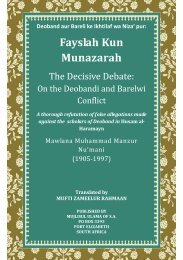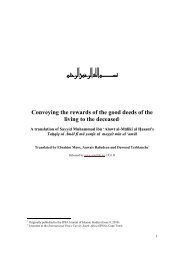al_etidaal_gn
al_etidaal_gn
al_etidaal_gn
Create successful ePaper yourself
Turn your PDF publications into a flip-book with our unique Google optimized e-Paper software.
differences occur in the many judgementS of Nabi Dawood and Nabi Sulayman<br />
(Alayhis S<strong>al</strong>aam). And in spite of these differences, did not Allah praise both of<br />
them?<br />
Allah says:<br />
“And we made Sulayman to understand (the case) And unto each of them we gave<br />
judgement and knowledge.” (21.78, 79)<br />
This shows that Dawood’s (Alayhis S<strong>al</strong>aam) judgement too was not against the<br />
Shariat. (Bayanul Quran)<br />
Differences between Abu Bakr and Umar (Radl<strong>al</strong>lahu anhum)<br />
Then listen further: Rasulullah (S<strong>al</strong>l<strong>al</strong>lahu Alayhi Was<strong>al</strong>lam) said: “In the heavens<br />
there are two angels. One commands severity and the other commands leniency. Both<br />
are right. One is Jibreel and the other is Mika-ecl (Alayhis S<strong>al</strong>aam). And there are<br />
two Prophets, one commands- severity and the other leniency and both are right. One<br />
is Ibraheem, the other Nuh (Alayhis S<strong>al</strong>aam). . .And there are two of my<br />
Companions. One commands severity and the other leniency and both are right. The<br />
one is Umar (Radi<strong>al</strong>lahu anhu) and the other is Abu Bakr (Radi<strong>al</strong>lahu anhu).”<br />
(JamiSagheer, Tabrani, Ibn Asaakir).<br />
While keeping this in mind, you should know that the Ulema of this Ummat, the sufis<br />
and <strong>al</strong>l the pre-eminent ones of every era <strong>al</strong>ways had some forms of differences.<br />
Sometimes due to their differences of disposition and nature the opinions of some<br />
truth-seeking, practicing Ulema inclined towards severity and harsh-attitudes. Some<br />
others again considered leniency to be more necessary in the same affair.<br />
The difference of opinion between Abu Bakr (Radi<strong>al</strong>lahu anhu) and Umar<br />
(Radi<strong>al</strong>lahu anhu) with regard to what should be done to the prisoners of Badr, is of<br />
this kind. Sayyidina Abdullah bin Masood (Radi<strong>al</strong>lahu anhu) says that when those<br />
taken prisoner at Badr were brought foward, Sayyidina Abu Bakr (Radi<strong>al</strong>lahu anhu)<br />
said: “Ya Rasulullah! these people belong to your tribe and they are your relatives.<br />
Leave them <strong>al</strong>ive and kill them not, for it is quite possible that they will repent.”<br />
Sayyidina Umar (Radi<strong>al</strong>lahu anhu) said: “Ya Rasulullah. These people belied and<br />
denied you. They forced you to depart from Mecca. Behead them.” The Companions<br />
could not agree as to whose opinion Rasulullah (S<strong>al</strong>l<strong>al</strong>lahu Alayhi Was<strong>al</strong>lam) wouki<br />
follow. Rasulullah (S<strong>al</strong>l<strong>al</strong>lahu Alayhi Was<strong>al</strong>lam) remained silent. He entered his<br />
house and soon came out again and said:<br />
Allah cause the hearts of some people to become soft, softer than milk. And Allah<br />
causes the hearts of some people to become hard, even harder than stone. Abu Bakr<br />
(Radi<strong>al</strong>lahu anhu), your example is like that of Ibraheem<br />
(Alayhis S<strong>al</strong>aam) who said:<br />
Al- Eti’da<strong>al</strong> Fi Maraatibur- Rija<strong>al</strong> 153




